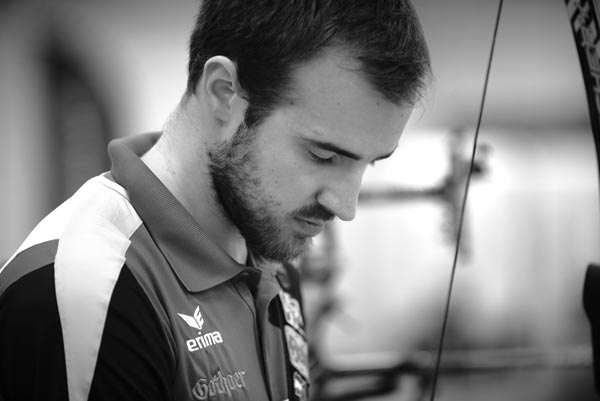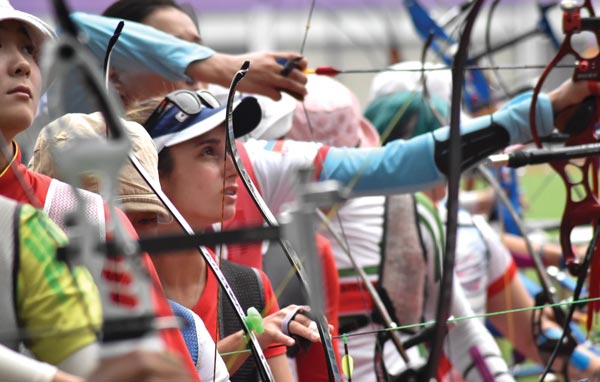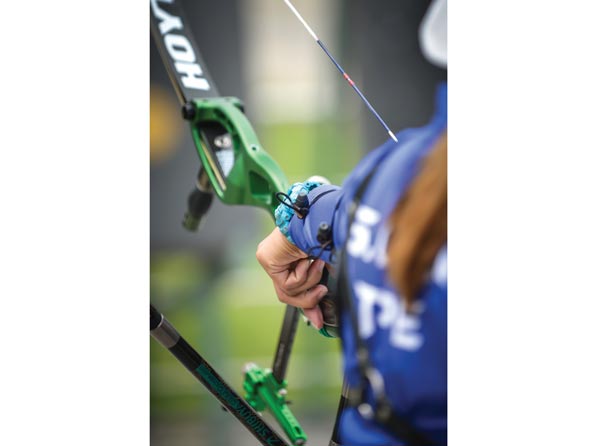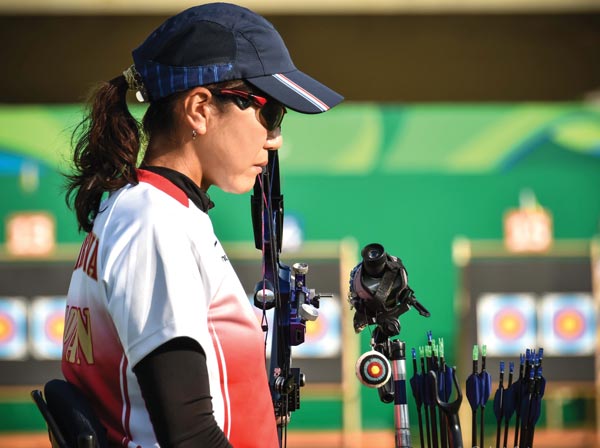Erin Prior points the way to developing a ‘growth mindset’ around the sport

By becoming more self-aware about which mindset you adopt, you can begin to change
As the margins between success and failure in sport are becoming smaller and smaller, often the difference between maximising your potential and falling short, is your mindset. Your mindset refers to the set of attitudes that you hold, and this influences your thoughts, feelings and behaviours, which ultimately impact your performance. There are two types of mindset we adopt. These are a ‘fixed’ mindset and a ‘growth’ mindset.
Imagine, an archer shoots in a competition and doesn’t perform as well as she had hoped. She starts to consider the performance of the other archers and notices that their scores were higher. She then concludes that the other archers are simply more talented, and that no matter how hard she worked, she would never reach their standard.
This is an example of an archer with a fixed mindset. When athletes adopt this fixed mindset, they often believe that talent and ability are set in stone. As a result, these athletes are very results-focused and self-critical when performing. This often leads to the athlete comparing themselves to others, rather than focusing on their own performance. If an athlete with a fixed mindset then doesn’t perform to their desired level, they often believe that they simply don’t have the ability to improve their performance. As you can imagine, this is a rather debilitative mindset which prevents learning and progression.
Imagine another scenario, an archer shoots in a competition and doesn’t perform as well as she had hoped. She reflects upon her day and recognises that there are parts of her technique that require further refinement and practice. She notices that other archers at the competition have achieved higher scores, and recognises that these higher scores are possible with perseverance and hard work. Coming away from the competition, despite not performing as well as she would have liked, she feels motivated, and plans to focus her training on particular aspects of her technique in order to continue progressing with her archery.
As you can see, this is a far more assertive approach and allows the archer to learn from their competitive experience and continue to develop their skills. This archer demonstrated a growth mindset, as she believed that ability is flexible and can be improved upon with learning. Athletes with growth mindsets are more process-focused, meaning they focus on their technique, as opposed to the results, and are therefore less self-critical when performing. Athletes with a growth mindset also recognise that their sporting career is a developmental journey, and an opportunity to learn and progress. The key difference between athletes with fixed and growth mindsets is that a growth mindset allows for improvement over time and places no restrictions on ability. This allows the athlete to set goals effectively and create action plans in order to work towards these goals.

Only you can unlock your full potential – don’t wait for success to come to you
The majority of athletes tend to adopt both mindsets at different points in time, but take a moment to consider which mindset you believe you adopt most often. Self-reflection and honesty is key here in determining where you can improve your mindset and ultimately positively influence your performance. To help you reflect upon your mindset, consider the following:
Do you believe that talent and ability are things that you either have or you don’t? Or do you consider ability to be part of a learning process that isn’t set in stone?
Do you avoid challenges as you don’t want to fail? Or do you embrace challenges as opportunities to learn and develop your skills?
Do you believe that setbacks define your ability, or use them as opportunities to inform your continual learning process?
These are just some key differences between a fixed and growth mindset, and by becoming more self-aware about which mindset you adopt, you can begin to change how you approach performance situations. This enables you to unlock your potential by embracing challenges and learning from setbacks in order to progress within archery.
Ultimately, you will need to be proactive and take ownership over your own mindset. Only you can unlock your full potential – don’t wait for success to come to you. Adopt a growth mindset, make opportunities to learn, and enjoy your archery journey!
1. Adapt your language
Developing a growth mindset can begin with some seemingly small but very significant changes in the language that you use when discussing your archery. When athletes have a closed mindset, they often engage in definitive language such as ‘I’m not a good archer’. This statement is very ‘set in stone’ and implies that their perceived ability (or lack of), is a constant. However, to develop a growth mindset, your language should consider your archery as a journey. Perhaps you have not achieved all of your goals, but there needs to be some recognition that the journey is not over yet. As an example, you could change the previous statement of ‘I’m not a good archer’, for something like ‘I haven’t achieved all of my goals in archery yet’. This statement is far more flexible and acknowledges the ongoing process of developing your archery ability, significantly impacting your perceptions of your archery.

elf-reflection and honesty is key here in determining where you can improve your mindset and ultimately positively influence your performance
2. Set Process Goals
Consider, why do you like archery? What are your goals within the sport? Often, archers can become wrapped up in winning or losing, or comparing themselves to others. With this as their main focus, many archers become increasingly frustrated when they don’t perform at their best, because of the mounting pressure they are putting upon themselves to win. Now it’s not to say that winning isn’t important – archery is a competitive sport after all, but it’s the stress that archers place purely upon winning, which causes them to adopt a fixed mindset. Ultimately, our archery careers are much bigger than one arrow, one competition or even one season, therefore it’s important to keep things in perspective and consider the bigger picture of your archery journey.
Again, consider what your goals are within the sport. When asked this question, most athletes can quickly list their goals: ‘shoot a six gold end at my longest distance’, ‘break into the top ten of the UK rankings’, ‘win the National Series Finals’. These are all credible goals, however they are all focusing on the outcome. Very rarely when archers are asked what their goals are within the sport, do they tell you their process goals, e.g. what parts of their technique, fitness or mental game they are working on.
Process goals are the stepping stones to achieving the results we are striving for, and by setting ourselves these goals, we are providing ourselves with a clear action-plan of how to improve our performance. As a result, this method of goal-setting promotes a growth mindset, as you are actively discovering which elements of your archery need to be improved in order to reach your potential. So take a moment to reflect. Consider what you would like to achieve in archery, but also consider how you are going to get there. (An article exploring process goals was in Bow International issue 122).
3. View Challenges as Opportunities
Adopting a growth mindset is all about believing that you have the capacity to progress within archery, and of course progression often involves being out of your comfort zone. Whether this refers to entering your first competition or competing in a selection shoot to represent your country, most of us tend to feel uneasy when we are faced with challenges. But by changing your mindset to view these challenges as opportunities to gain experience and learn more about yourself and your archery, you are giving yourself the best possible chance of continuing to improve your performance.

The key difference between athletes with fixed and growth mindsets is that a growth mindset allows for improvement over time and places no restrictions on ability
4. Develop Patience and Perseverance
Persevering in the face of setbacks is particularly important when challenging ourselves. Of course, we all want to shoot well, achieve personal bests and win competitions, but by focusing too intensely on our results, we begin to desire instant gratification which may not always be satisfied. This tends to lead to athletes staying within their comfort zone for fear of losing competitions. To counteract this, it is important to develop an appreciation for learning and developing our skills over time, and use these to assess our progress, as opposed to being entirely results driven. Only when we value the process, will we begin to see results.
5. Learn from Constructive Feedback
When considering the importance of learning when working to improve your archery performance, try to avoid becoming defensive in the face of constructive criticism. Instead, take the comments onboard and consider what you can learn and take forward with you. This also goes hand-in-hand with embracing change. Many of us are often reluctant to change our technique or try something new, and this often limits our ability to progress and perform to a higher standard. Therefore, embracing change is essential. Not every change will work for you, but by trying out different options, you can be sure that you are doing the most you can to improve your performance.
Erin Prior MBPsS is a Trainee Sport & Exercise Psychologist working with organisations such as Loughborough University and Aston Villa Football Club. If you’re looking to enhance your mindset to improve your performance, get in touch: EPSportPsychology@gmail.com
This article originally appeared in the issue 124 of Bow International magazine. For more great content like this, subscribe today at our secure online store www.myfavouritemagazines.co.uk

